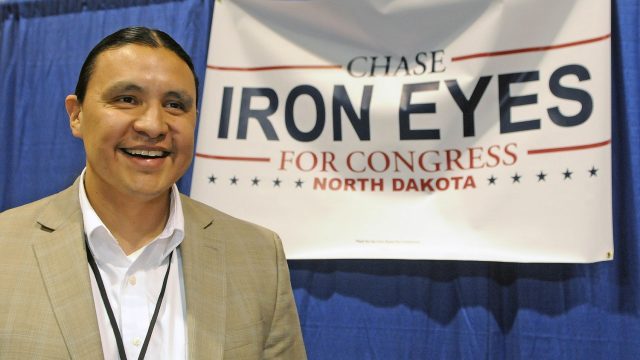Native Americans On The Ballot Is A Good Thing For North Dakota

TOM STROMME/Tribune Chase Iron Eyes speaks at his booth at the 2016 North Dakota Democratic-NPL state convention where he is seeking the party's nomination for Congress. The convention continues Saturday in Bismarck.
Earlier this week I wrote about Democrats doing something that is unprecedented in North Dakota politics.
They’re running three Native Americans for statewide office.
I also noted that the Democrats had at least two Native Americans running for the Legislature as well, but today Mike Nowatzki points out in an article that there are at least two more that I missed.
Per Nowtazki’s article, Democrats acknowledge having put at least some effort into recruiting Native American candidates, and we’ll in November how that works for them politically. Identity politics are an ugly reality in American politics, but a reality none-the-less.
I hope that these candidates will be weighed by voters based on their ideas and qualifications and not anything else.
That said, from the perspective of a human being, I must say that I am delighted to have so many Native Americans on the ballot.
Back during the fight over the “Fighting Sioux” logo and nickname at the University of North Dakota I spent a lot of time talking to pro-nickname members of the Spirit Lake Sioux tribe. One point they made which resonated with me was that they felt the university moving away from the logo/nickname was just another example of white society erasing Native Americans from their consciousness. They felt like the logo and nickname honored them, and that calling it racist and offensive is a slight to them.
[mks_pullquote align=”right” width=”300″ size=”24″ bg_color=”#ffffff” txt_color=”#000000″]Native Americans in North Dakota tend to be concentrated on insular, isolated reservation communities. For most in the rest of the state, they’re out of sight and out of mind.[/mks_pullquote]
A controversial point, to be sure. I don’t need to tell you readers that the Native American communities were sharply divided on the logo/nickname. But in a larger sense, outside of the “Fighting Sioux” issue, I don’t think many people would disagree with the idea that society as a whole tends to forget about tribal communities.
Native Americans in North Dakota are concentrated on insular, isolated reservation communities. For most in the rest of the state, they’re out of sight and out of mind.
This is an unfortunate situation promoted in many ways by both Native Americans and non-Native Americans alike.
The reservations were created to get America’s indigenous population out of the way of westward expansion. Today the reservations are clung to by Native American leaders as largely sovereign areas under tribal control, but this results in a sharp divide between reservation communities and everyone else.
These candidates who have come forward to run for statewide office may mark a shift.
One of the first questions I got from a reader after I wrote my post about the candidates earlier this week was whether Native Americans are qualified to hold state or federal office. Because of the whole “sovereign tribes” thing. If they’re members of sovereign tribal nations, how can they be on the state and federal ballot?
Of course these candidates are qualified to run for office. Though the tribes are unique political entities in our country, thanks to a long and often ugly history I don’t need to rehash here, tribal members are still Americans and North Dakota citizens and have the same right to compete for and hold public office the rest of us enjoy.
Politically speaking, these candidates are long shots. North Dakota is a deeply Republican state, and the three statewide candidates are late getting into the race. They probably aren’t going to win.
But I hope their presence on the ballot might mark the beginning of the end to this idea – which is manifest among both Native Americans and non-Native Americans alike – that tribal communities are somehow separate and apart from the rest of North Dakota.
They’re not. They are a part of the fabric of this state, and it’s time we all started acting like it.




